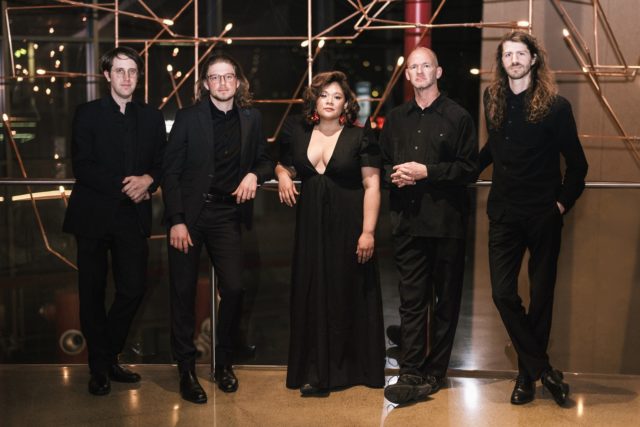Returning for its eighth year right in time for Jazz Appreciation Month, the Spring Dig Jazz’s first 2022 event featured a collaboration between Filipina-American singer, writer, and teacher Leslie Damaso and the multi-genre music group Mr. Chair. Hosted at the Arts + Literature Laboratory (ALL) in collaboration with the Madison Music Collective, Damaso’s original work “Sirena,” was performed live last Friday, April 1st. Compellingly weaving the elements of myth, romance, and patriotism, “Sirena” tells the story of a young mermaid who falls in love with the moon (Bulan), the forbidden romance responsible for the creation of the Philippine islands.
Friday’s show was the most recent evolution of a six years-long collaboration between Damaso and Mr. Chair. Pianist Jason Kutz and Damaso first performed together at a recital titled “The Tears of Things,” which featured two kundiman songs (traditional Filipino songs of love and freedom) that reflected on the more-than-three centuries of Spanish colonization in the Philippines. With that original audience hungry for more, Damaso recorded and released eight kundiman songs for her 2018 album “May Laya.”
“At that time, I was also yearning to make a connection to the Philippines, where I was born, and also to define home and my identity as a Filipino-American,” Damaso said. “A few months [after the album release], I saw Mr. Chair in concert and I imagined immediately how fantastic the kundiman would sound with their maximalist mixture of jazz, rock, and classical styles filled with the range of human emotions,” Damaso said. “Their boundless expression of joy caught me but also how incredible they were as musicians.”
Genre-bending in every way, Damaso successfully balanced storytelling, various jazz styles, and visual artwork to create a universe that collapsed both time and planes of knowing. Bouncing between spoken word excerpts, contemporary renditions of kundiman songs, and instrumental numbers, the comprehensive nature of Damaso’s work left few stones unturned in this project of cultural and historical reimagination.
“Sirena’s” narrative aspect was told over the course of a “brown out” from the perspective of a Lola (grandmother) in a small Filipino village, returning its audience to a childlike curiosity characterized by an unfiltered reception to anything they might encounter. Damaso drew particular inspiration from her upbringing in the Cagayan Valley’s Isabela, which is located along the Cagayan River. “I wanted it to feel very old, pre-colonial,” Damaso expressed. At times somber and cautionary, and at other times lively and celebratory, the musical arrangements remained loyal to the dynamism and turmoil inherent to love, conflict, and nation-building.
With Damaso’s colorful, nature-inspired artwork projected on the walls of the performance space, the audience was immersed into a world equally marked by curiosity, desire, and vivid expression. Featuring both watercolor and pen, these pieces also incorporated the ancient Filipino script of baybayin, another nod to Damaso’s roots. The traditional jazz ensemble (featuring bass, piano, percussion, violin, and trombone) was also accompanied by melodies played on the kulintang, an instrument made up of a set of gongs native to the Maguindanao region of the southern Philippines.
Though jazz and kundiman songs initially seem incongruous both in genre and time period, Damaso spoke of the two genres’ deeper compatibility. “I read something a few days ago that said that the root of the expressions of jazz is human suffering. This melding of styles works because of that shared feature,” she explained. “When Americans colonized the Philippines after the Spanish, they brought jazz to the country. There was a famous singer, Atang de la Rama, who pioneered the combination of kundiman and jazz. Conflict is impossible to sustain, humans crave connection. It all comes down to love.”
Damaso and Mr. Chair’s contemporary music arrangements of kundiman songs successfully turned the prism on feelings of devotion and yearning. Songs like “Dahil Sa Iyo” (Because of You) by Mike Velarde and “Bayan Ko” (My Home) by Constancio De Guzman were each given new contemporary life in ways that were experimental but remained true to the songs’ underlying messages. The chemistry between Damaso and trombonist Mark Hetzler was particularly palpable during Ilocana folk song “O Naraniag a Bulan” (Oh Bright Moon), where Damaso’s operatic vocals were given both clarity and texture.
“It has been such a beautiful, satisfying, and healing experience to see this project come to life and to be able to showcase it with my dear friends and collaborators,” Damaso said.
The next two free Spring Dig Jazz events will take place over the next two Fridays at Art + Lit Lab at 7:30 p.m.. Virtual streaming options are also available for both events. Find more details here.




























